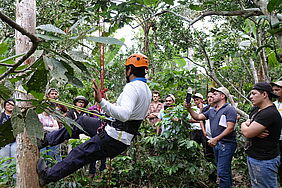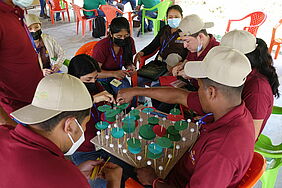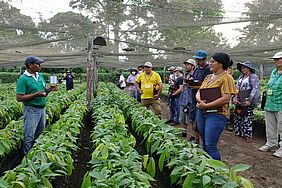How can Latin American farmers be supported in establishing and maintaining ecologically and economically sustainable agroforestry systems? Further, how can these methods be better preserved and disseminated? An international workshop held from 7 to 19 November 2021 at the Sana Ana Research and Training Centre in Bolivia focused on organic cocoa production in agroforestry systems.
FiBL organized the workshop in cooperation with the Bolivian partners of the SysCom project (Farming Systems Comparison in the Tropics), Piaf El Ceibo, Ecotop and the Institute of Ecology of the University Mayor de San Andrés in La Paz. It was aimed at advisers who train farmers or other advisors. Participants arrived from Bolivia, Ecuador, Peru, Honduras, the Dominican Republic and Ghana.
Tips and suggestions from the field
In order to motivate the participants to use diversified or dynamic agroforestry systems, results on economic and ecological sustainability from the SysCom project in Bolivia were shared, the trial plots, as well as various agroforestry plots of farmers in the region were visited and videos sharing personal experiences were shown. Dynamic agroforestry systems feature a high number of plant species and a high tree density. The different layers under and above the cocoa trees are used to produce biomass - the engine of the system - and a variety of products.
In the workshop, different types of agroforestry systems with cocoa and their respective sustainability, for example in terms of water balance, were discussed, as well as the pruning of shade trees or the situation-adapted and goal-oriented design of agroforestry systems for farms. All the main partners of the SysCom Bolivia project were involved. The Ecotop Foundation, which specialises in advisory services for dynamic agroforestry, contributed its practical experience in establishing and managing agroforestry systems. El Ceibo, the world's first cooperative centre with certified organic cocoa, showed its post-harvest and processing facilities as well as its tree nursery, and the Institute of Ecology of the university in La Paz contributed interesting exercises on pollinators, birds and spontaneous vegetation.
In addition, training materials produced in the "SysCom Bolivia Diseminación" project were distributed. These are intended to support the advisers didactically and in terms of content in their work on agroforestry systems.
Award-winning programme
The SysCom programme won the SHIFT Prize 2021 in mid-November. The international research prize awarded by Biovision and the Agropolis Foundation honours agroecological projects that promote sustainable development and contribute to transforming food systems. It was awarded for the first time in 2021 and is endowed with 20,000 Swiss francs. The award ceremony took place during the "Agroecology Europe Forum 2021" in Barcelona (Spain).
Further information
Contact
- Johanna Rüegg
- Monika Schneider
- Beate Huber
Links
- systems-comparison.fibl.org: Website of the programme SysCom - Farming Systems Comparison in the Tropics
- systems-comparison.fibl.org: SysCom Bolivia
- youtube.com: Video "Long term comparison of cocoa production systems (SysCom Bolivia)"
- fibl.org: The SysCom programme in the FiBL project database
- orgprints.org: Interview in German only "Eine andere Art von Biolandbau" about the SysCom programme from the magazine Bioaktuell 10/2021
- elceibo.com: Website of the El Ceibo cooperative centre
- ecotop-consult.de: Website of the Ecotop Foundation






